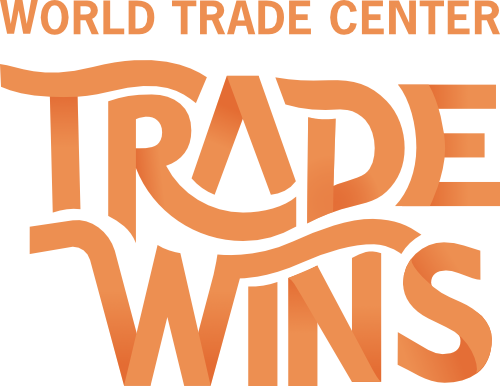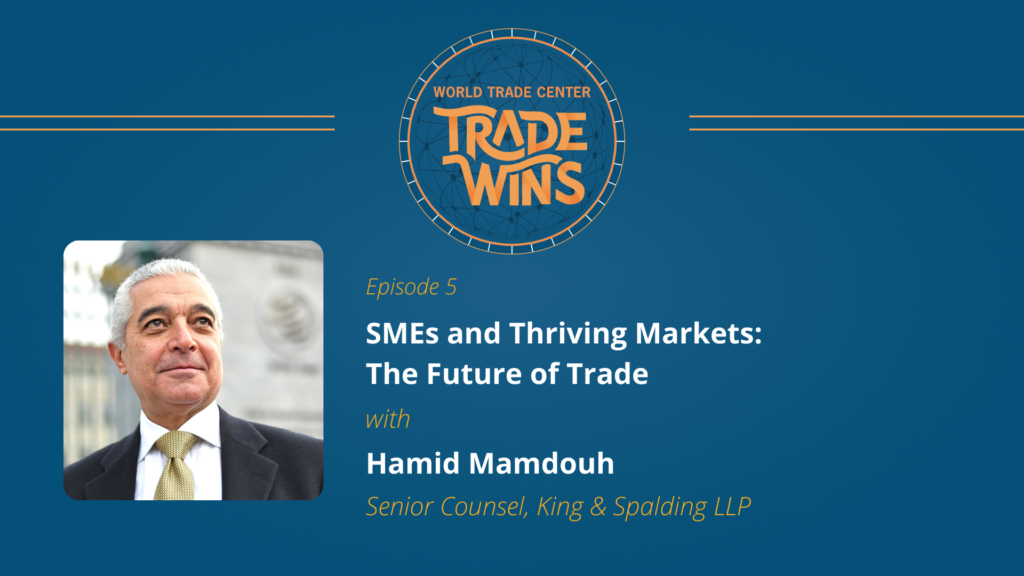Robin van Puyenbroeck 0:10
Welcome to Trade Wins. I’m Robin van Puyenbroeck, your host, and I’m excited to present this special series of seven episodes with a set of unique conversations I had with global leaders from the public and private sector during the WTCA 2021 General Assembly. The conversations happened during the last week of April with a live, virtual audience from 70 countries. This gave me the opportunity to also poll a global audience on some very pertinent questions. Poll results provided not only further food for thought but also calls to action. Now let’s get started.
Joining us from Geneva is Hamid Mamdouh who is currently a senior counsel at King & Spalding after a most successful career at the WTO and also at the Egyptian diplomatic service. Hamid is a leading expert on the topic of reform of the international trade system, including WTO reform. He will engage with us on the topic of “Small/Medium Enterprises and Thriving Markets – What’s the Future of Trade.” So, Hamid, so good to see you again and welcome. Let us get started and I hand it right over to you for opening remarks.
Hamid Mamdouh 1:24
Thank you very much, Robin. Thank you very much for the invitation and it is indeed a pleasure to be with you today and with the audience. I’m particularly happy with the title of the session that links small and medium-sized enterprises with the future of trade. And I say that because I started my international trade diplomacy career way, way back in the early 80s. I was 12 years old at the time. So you can imagine it’s been quite a journey. But throughout all the negotiations and putting together the system of the WTO, moving from the GATT to the WTO and all of this, it’s fascinating to look back and realize that the system actually was designed particularly with multinationals in mind, big companies. It was not designed to effectively serve small and medium-sized enterprises, particularly if you go further and think about, you know, micro enterprises. We have come to a point now where I think we need to have a view of the situation and see what we need to do in order to identify the challenges that both are facing. We’ve come to a situation today with the way the system itself is facing a lot of challenges, I’ll come to that in a minute. That’s why we talk about reform all the time. SMEs are facing challenges as well and each of them has a set of issues. We need to clearly identify those two sets of issues for SMEs and for the system. And not just to identify them, but hopefully to align them at some point so that the system would be more inclined towards helping SMEs. I can think quickly of how each one of those items that I would mention can unpack it in a session by itself. I was thinking that the biggest challenges that are facing SMEs today in which we need to do something collectivity, first is the regulatory burden. How do we reduce the regulatory burden on small and medium-sized enterprises? And when we think about trade, I keep emphasizing actually, and I can’t repeat this enough, we’re talking about trade in goods and trade in services. So trade is not just about merchandise trade. Actually, services today 70% of the global GDP and the services sector in any economy today is bigger than the rest of the sectors combined. So when we think of trade, we cannot just think exclusively in terms of trade facilitation in goods. We need to think also of trade and services and what kind of regulatory barriers that small and medium-sized enterprises in the area of services would face. You just look around and the world is full of them in various service sectors. The second issue is access to finance and access to cross-border payment systems. This is the second challenge that SMEs face. And that, again, you can unpack that set of issues into further detail regarding how do we regulate financial services, how do we create a competitive environment for financial services that would involve liberalizing financial services across borders but also have sound regulation. The third element would be access to information. A lot of SMEs and micro enterprises complain about how difficult it is to have adequate access to information. You know, big corporations have departments and have the resources to seek information themselves and be well informed all the time. But for SMEs, it is a bit of a challenge. And it’s not just about access to information or about regulation and policies. It’s also about involving SMEs in the regulatory process itself and giving SMEs a voice in shaping up policies and regulations. And then the fourth and last issue here, which I think is terribly, terribly important is how do we harness the power of digitalization for SMEs. This issue has come to the forefront with COVID-19. With all the challenges and all that the crisis has revealed to us in terms of the potential of digitalization and crossing borders, we’re seeing a new kind of globalization today. Now, for SMEs there are different challenges in relation to digitalization. Digital tools and digital capabilities are not distributed equally among countries. There are challenges there, be it in terms of regulatory barriers when it comes to cross-border data flows or localization requirements or even when it comes to the digital divide that inhibits SMEs in a lot of developing countries and engaging in global markets.
Hamid Mamdouh 8:11
Now, these are very roughly the kind of issues that come to mind with respect to small medium-sized enterprises. The way to deal with them is through the trading system, but the trading system is in trouble. And the WTO is facing an unprecedented challenge, I would say an existential challenge. You see, the WTO system, actually, I always likened it to a tripod. It stands on three legs – dispute settlement, negotiation, and the deliberative function. Now without getting into too many details, it’s enough to say that those three functions have broken down and particularly, the negotiating function which is like the legislative function in any legal system. We have not been able to update the rules. But everybody talks about, “Oh, we need to update the rulebook.” Okay. How? What? These are the real questions that we need to get into. And thinking about small medium-sized enterprises will give us hints about what we really need to do. First of all, I would say, when it comes to reforming the WTO, I think it is very important to take a good diagnostic view of why the system has broken down. It’s the absence of leadership and the absence of leadership has been manifested since the financial crisis. It’s getting worse as we go. Second, it is the increasing complexity of trade policy issues, whether it’s manifested in digital trade, regulatory barriers, or important sectors like the financial sector or transport or logistics. There’s a huge agenda there in terms of complex issues. And the third, really, is can we reconfirm the common purpose of the system? We’re not quite sure that we share today the common purpose behind the system. Now, these are our problems. Let me emphasize here before we condemn the WTO to a lot of failure, there’s an international cooperation crisis at large, not just in the area of trade. This is just today’s reality. It is quite alarming for someone like me of long experience and an old age to come and say, it is quite fascinating that at the time when the world actually needs the highest level of collaboration to find global solutions to global problems, we’re finding the lowest levels of international cooperation on global issues. So something needs to change here at the political level. Now, when it comes to trade, we can try to have conversations that would inspire the enlightened self interest from political leaders. I think the COVID crisis has brought that need to collaborate into focus. It’s the optimism that one can search for now and we have to be optimistic. I know that optimism is not a plan and it’s not a strategy, but it gives us the courage and the energy to go forward. There are huge, huge challenges to reforming the functions of the WTO. And here, if I may just introduce an element of distinction, Robin, I would distinguish the individual files that we have and the negotiations on the negotiating table under WTO today, whether it’s fishery subsidies or electronic commerce or domestic regulation and services, these are individual files. The deeper problem is that we do have systemic failures. We do have systemic challenges. The three functions, the tripod legs that I referred to, are broken. We need to fix that. And I don’t think that simply going for quick wins on things like fishery subsidies would actually reform the WTO. I’m not against quick wins at all. Actually, it’s desirable. It sort of gives us the energy to go forward and puts us back on the map. But if we do that in the absence of looking at systemic failures, I think we might repeat a scenario that we saw in ?Valley? when we agreed to a trade facilitation agreement and we left the systemic challenges unresolved and the situation got worse. Now, the elephant in the room here is the trade tensions, in particular the US and China. We need to find ways to see the WTO as part of the solution and not part of the problem. Let me stop here, because I would like to actually focus more on the questions that you have in mind or the questions that the audience might raise. But what I would say at the end is that each of the points that I raised would actually warrant a session by itself. I was just trying to provide an overview. So back to you, Robin.
Robin van Puyenbroeck 11:48
Yeah. Well, thank you, Hamid. Very inspiring and I really appreciate such a critical reflection. We’ll go straight into some questions. Please put your questions in the Q&A box and we also will have a poll up that goes straight to the core, Hamid, of some of the things you’re talking about. Question one is, “Can SMEs sufficiently thrive in the current global trade infrastructure?” The second question is, “Is reform of the global trade infrastructure necessary to create better and more equal opportunities for SMEs to grow?” So you’re mentioning the more systemic failure and the crisis at large of international cooperation in general and you mentioned quick wins, that we should not be against quick wins. I would hear three very practical things governments, and by extension, various international organizations could do immediately to support SMEs both in developed and developing countries. What would they be? Three immediate quick wins that could actually make a difference.
Hamid Mamdouh 12:50
Three immediate things to do, really, again, I have nothing against quick wins at all. But if we’re thinking of things that can be achieved in the WTO, we do have a package that was adopted by the joint statement initiative, negotiations on micro, small, and medium-sized enterprises in the WTO. It looked at six elements, six factors, where action would be needed. Now that serves a huge, this is not legally binding, but that serves a huge purpose of identifying the targets that we should focus on. I would say, the most immediate thing, how can we make some of those elements, the six elements there, I’m not sure whether these have been sort of mentioned in previous presentations, but they’re sort of a breakdown of the of the four elements that I mentioned – about information, about access to finance, about regulatory burden, and about digitalization. How can we turn some of those into principles that WTO members would follow? Now, the second thing is, I think, what we need to add to this also is that a special effort needs to be made by governments, particularly in developing countries and also in a lot of developed countries, to inform SMEs about the extent to which the multilateral trading system can be of use to them. I don’t think there is enough awareness among SMEs about trade agreements. And here, it’s not just about the WTO, it’s also about regional agreements. I see this in a lot of developing countries where I’m invited to give advice. The first question, one of the first questions I ask is, how far do you inform and how regularly do you inform your SMEs about what the current trade agreements offer them in terms of possibilities and their potential export markets? What should they hold the governments of export markets accountable to in terms of their legal obligations internationally. So that will be the second thing, which is really critical. The third thing, which is very obvious and very simple is, can we make some headway, please, on the ecommerce negotiations because the ecommerce negotiations is a package of goods and services trade, but also is a package of regulatory disciplines that will help harness the power of digitalization which is critical, critical for SMEs, critical, and even for micro enterprises. You know, there are market operators today who could not actually have joined the market without digital means, digital solutions. We need to pay attention in that respect to the digital divide, because the ecommerce negotiations today, I believe, the ecommerce negotiations today can make a very, very substantial contribution to bridging the digital divide and helping SMEs in developing countries and LDCs.
Robin van Puyenbroeck 16:10
Yes, so many good points there. I think you also mentioned how SMEs can be involved in the regulatory process and the negotiations. We have a lot of questions coming in, I have to say, on reform of the system itself. I’m trying to synthesize here, also referring to quick wins. Again, maybe I’m repeating myself with this, but that’s just what the audience is coming up with here is what single step is required to really start reform at the WTO, knowing that it’s not about the institution itself. It’s the stakeholders, right? It’s the governments that make the WTO. So what single step can be done to start the process to make the system work better?
Hamid Mamdouh 16:53
Well, first of all, you’re making a very good point, a very good point about the nature of the WTO. The WTO is a forum; it’s not an actor. That’s a very important point to keep in mind. And the effectiveness and the success or failure of the WTO depends on what members do. Now, the single most important step today, and it’s a huge step, I wouldn’t call it a step, it’s something that needs to be done to, for God’s sake, have a political vision about where WTO reform is going. Where do you want to take the system? And let’s take the negotiating function, Robin, as an example. The negotiating function has broken down. The negotiating function has systemic failures, systemic issues that need to be resolved. Having a quick win on something like fishery subsidies or ecommerce is not going to fix those systemic challenges. And if you ask me what the systemic challenges are, I try to not get into too much specialized talk here, but they refer to the principles and bases on which negotiations take place – the question of plurilateral negotiations versus multilateral negotiations, what type of negotiated outcomes should we aim for, would negotiated outcomes be applied on most-favored-nation basis or not, what kind of special and differential treatment, how are developing countries going to be treated in outcomes of future negotiations given the huge diversity between developing countries today. The developing countries are no longer a homogeneous group like when the concept of special and differential treatment was created in the early 60s. The concept is terribly important. It is embedded in the system. The system will not function without it. But the question now is how do we apply it? How do we implement flexibilities for developing countries that take into account the diversities that we have? How do you use different negotiating modalities so that we don’t break down again like we did in the Doha Round? These are very technical issues. Now is not the time to unpack them, I’ll be more than happy to do it, but I wouldn’t inflict that on the audience. But these are the kind of systemic failures that need to be addressed. Without addressing those, the negotiating function as one of the three legs of that tripod would not stand. And if it doesn’t stand, then we’ll continue not to have outcomes, regardless of how much or how many political statements we make.
Robin van Puyenbroeck 19:39
Yes, and of course, the next step is what you mentioned, Hamid, is refining the purpose of the system and the rulebook. Another question here also comes in, how can the WTO actually then work on enforcing the rules to new entrants, the new entrants to the WTO agreements? How would you assess the success of dispute resolution because it’s all within the WTO system? It’s all nice and well to have the rules and have people join, but if nobody abides by the rules and the rules cannot be enforced, that creates a very different set of issues. So what’s your view on that?
Hamid Mamdouh 20:13
My view on that relates to what I said earlier about a political vision to WTO reform. And what I failed to mention, what I always have in mind, is that the approach to WTO reform cannot be piecemeal. It will have to address the three legs of the tripod, including the dispute settlement function. As you rightly said, Robin, you can’t have new goals without enforcement. And the breakdown in the dispute settlement function was the last breakdown in the three pillars. It is the result, in a way, of the earlier breakdown in the other two pillars because the system was designed with the three legs of the tripod standing with a certain balance in the distribution of weight. There’s this interconnectedness between those three functions – the deliberative function, the negotiating function, and the dispute settlement function. As a lawyer, I would see the dispute settlement function and the negotiating function are akin to the judicial authority and the legislative authority in domestic legal systems. I mean, this is just an analogy to illustrate the point. But the negotiating function is the treaty legislative function and the dispute settlement function is the treaty adjudicatory or judicial function. It will have to be reformed. Do we have a breakdown of the appellate body? Absolutely. Can we look into the root causes for that, please? Can we have a conversation? Until now, Robin, we have not had the right kind of conversations where we would do a good diagnostic analysis and see what problems need to be solved before we jump to solutions. That has not happened. We are still suffering from short-termism.
Robin van Puyenbroeck 22:07
Hamid, there is a very interesting question here. So in the WTCA there are over 300 World Trade Centers in almost 100 countries. What can we do as an organization, because, ultimately, our World Trade Centers represent so many businesses in the 10s of 1000s, mainly SMEs. So what can we do, what can our members do, our World Trade Centers do to support the changes that are necessary to create more fair policies?
Hamid Mamdouh 22:39
I’m very happy you raised that question because what you can do is reinforce the engagement of the private sector in the shaping of the system. That has to happen. The private sector must play a bigger role. You know, let me just give you in 30 seconds a very nice snapshot of the past and try to apply it to the present. I was thinking about the run up to the Uruguay Round which was the biggest reform in the history of the multilateral trading system. It’s what moved us from the old cottage called the GATT to this big mansion called the WTO. And, of course, it’s a different world today, of course. But there are similarities because, at the time, we reached a point where we realized we needed a new deal. We needed something different because the GATT was no longer fit for purpose. I’m not saying that this situation is exactly the same today because there are so many details. I mean, you don’t need to move from the WTO to somewhere else, but you need, at least, to have a good diagnostic analysis. But then, I was thinking of what were the enabling factors, actually, that made the Uruguay Round happen and produce the WTO. There are three critical factors and the first is leadership, leadership, leadership, leadership – from governments.
Robin van Puyenbroeck 24:10
Yes.
Hamid Mamdouh 24:11
And, of course, leadership inside the WTO. The second is a blueprint. We don’t have a blueprint yet for what system we do want. What deal do we want? And that would have to be guided by the leadership. But then the third element, which relates to your question, is that we had tremendous support from the private sector at the time. We don’t have that now. The private sector has disengaged even when we launched the Doha Round in 2001 for the past 20 years. So the direct answer to your question, Robin, what can you do? I think for us collectively, since I’m in the private sector now as well, is how can we make sure that the private sector would play a critical role in shaping the WTO of the future. You know, one of the things that I always repeat is that let’s not talk about the future of the WTO but let’s talk about the WTO of the future because it could look a little bit different. But then, the private sector really is our reality check and the private sector needs to be engaged more.
Robin van Puyenbroeck 25:20
Well, there’s so much more for us to talk about. This has been a very, very interesting conversation. So a very last, final question, Hamid, if you could give us a very short answer because you mentioned leadership and of government. So at the core of the global trade system is the US/China relationship and you mentioned that earlier also. It’s under tremendous pressure. So how do you see this evolve? Do you see a new balance being created that will then ultimately provide stability to the global trade infrastructure?
Hamid Mamdouh 25:48
I think, if we sort of hover at a higher altitude and look at this sort of high political strategic level I think the US and China will be facing, if they’re not facing already, a fork in the road about what kind of scenario would they go for. Would they go for a scenario of mutual accommodation or would they go for a scenario of competitive rivalry? And here, I’m not just talking about trade, I’m talking about the overall. So the choices to be made are critical. And I think when we come to the trade reform, the reform of the WTO, let’s always remember, we’re talking about reforming the WTO. We’re not talking about reforming countries, right? So we should deal with countries as they are, but then reform the system to deal with the consequences of those differences so that we can create a level playing field and have a competitively neutral global trade platform. Now how do we get there? There are lots of political questions and a lot of questions inside the WTO as well about how do we make the WTO part of the solution and not part of the problem. Some rules will have to change. That’s just the reality.
Robin van Puyenbroeck 27:21
Yeah, absolutely. And I think when we’re talking about support and engagement of the private sector, I think our poll is very interesting here because this is where we hear directly from SMEs and companies around the world. Question one was, “Can SMEs sufficiently thrive in the current global infrastructure?” Forty-eight percent say, “Yes” and 52% say, “No.” So that’s sort of a 50/50. But on the question, it’s a yes or no question, “Is reform of the global trade infrastructure necessary to create better and more equal opportunities?” It is 100% yes vote for that, that reform is necessary. So I think that’s an important takeaway. So with that, Hamid, thank you so much for this candid conversation. Clearly, there’s a lot of work ahead of us and we will continue this conversation. Thank you so much.
Hamid Mamdouh 28:10
Thank you very much, Robin.
Robin van Puyenbroeck 28:13
I hope you enjoyed this special episode from our General Assembly. Make sure to tune in for all of the episodes. Thank you for listening.






